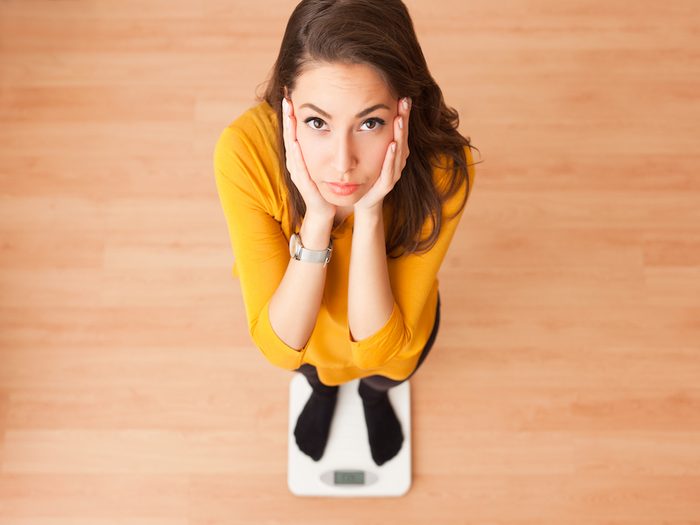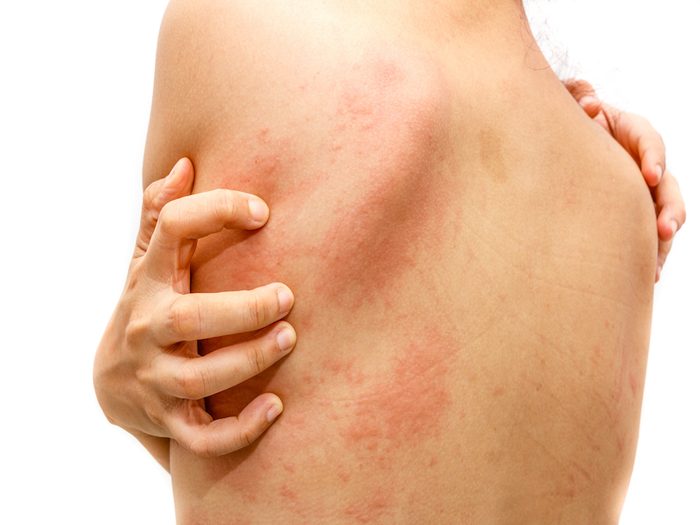
Your weight starts to fluctuate
“Stress triggers the release of the hormone cortisol, which impairs your body’s ability to process blood sugar and changes the way you metabolize fat, protein, and carbs, which can lead to weight gain or loss,” says Dr. Shanna Levine, a primary care physician and clinical instructor of medicine at Icahn School of Medicine at Mount Sinai in New York City. Stress can also cause people to engage in unhealthy behaviours like overeating or under eating.

Your hair is falling out
Losing a few strands of hair is normal (old hair follicles are replaced by new ones over time), but stress can disrupt that cycle. Significant stress pushes a large number of hair follicles into what’s called a resting phase, and then a few months later those hairs fall out, according to MayoClinic.org. Stress can also cause the body’s immune system to attack your hair follicles, resulting in hair loss.

You break out in hives
If you’re suddenly covered in itchy red bumps, stress (not allergies) might be to blame. When your body experiences excessive stress (for either a short or long period of time) your immune system gets wonky and your body starts releasing the chemical histamine to fight off your ailment. If the stress doesn’t go away, you essentially develop an allergic reaction and, boom, hives galore. When your immune system is weakened by stress, your skin can also become irritated by things it never used to be sensitive to, such as soap, cold or heat, lotions or laundry detergent.

You keep getting headaches
If you’ve never suffered from headaches but suddenly your head is constantly pounding, you might be too stressed. Stress releases chemicals that can cause changes to nerves and blood vessels in the brain, which brings on a headache. Prone to migraines? Stress can trigger them or make them worse. It’s also common for your muscles to tense up when you’re stressed, which can also cause a headache.

Your tummy is just off
Stress can disrupt the function of your GI tract in more than one way. It can cause the body to produce more digestive acid, leading to heartburn. “It can also slow the emptying of food from the stomach, which causes gas and bloating, and may even increase the number of times your colon contracts, leading to cramping and diarrhea,” Dr. Deborah Rhodes, a Mayo Clinic internal medicine physician, told Parents.com.

You always have a cold
Stress suppresses the immune system, which makes it easier for you to get sick and makes it harder to fight off bugs. “When people are stressed, they get sick. It could be a cold or cold sores, which pop up because the immune system can’t suppress the virus,” says Dr. Levine. Researchers at Carnegie Mellon University in Pittsburgh infected volunteers with a cold virus; those who reported in a survey that they were coping with stresses were twice as likely to get sick as those with fewer problems, Parents.com reported.

You have acne … again!
You thought acne was a distant teenage nightmare, but if your face is suddenly a mess of pimples, stress might be causing your breakouts. When you’re stressed, your body pumps out more hormones, like cortisol, which causes skin glands to produce more oil. This excess oil can get trapped inside hair follicles, along with dirt and dead skin cells, producing pimples, according to Healthline.com.

Your brain feels fuzzy
Stress can make you mentally sick, too. Too much of the stress hormone cortisol can make it harder to focus or concentrate, causing memory problems as well as anxiety or depression, says Dr. Levine.
